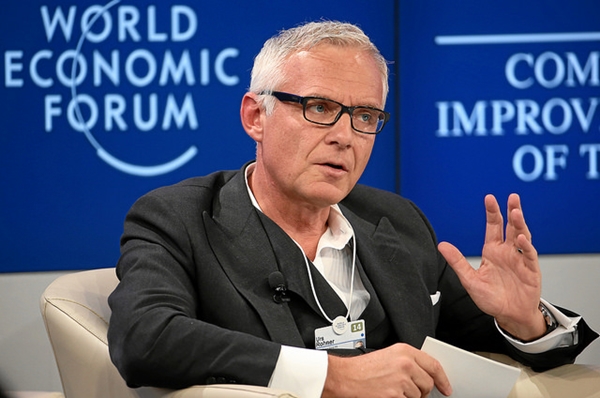Art Fairs
Credit Suisse Went “Undercover” at Art Basel to Recruit Tax Evaders


Ben Davis

Last year, Credit Suisse co-sponsored a special event in honor of Chicago artist Theaster Gates at Art Basel in Switzerland, as part of a “thought leadership” series hosted by Urs Rohner, chairman of the executive board of Credit Suisse Group, along with Dasha Zhukova and Daphne Guinness. The audience included high rollers like Eli Broad, Larry Gagosian, Peter and Harry Brant, and CAA head Bryan Lourd. The Swiss bank was clearly eager to capitalize on the hard-won credibility of Gates’s socially engaged art to burnish its image: “Chicago’s rising art star Theaster Gates is rapidly becoming one of the most influential people in the business,” it wrote on its website. “He uses art as a catalyst for social activism and is persuading the world’s wealthiest to lean in to his vision.”
It turns out that Credit Suisse may have had another, baser motive for building ties with the art fair franchise—and it was very far from getting the wealthy to “lean in.” In fact, just the reverse. The bank now faces $2.6 billion in penalties after pleading guilty to criminal wrongdoing for facilitating tax evasion, the biggest such penalty ever, though one some still consider a slap on the wrist. The news coming out about its guilty plea includes some juicy stuff about Credit Suisse’s efforts to use the art fairs, specifically the Miami edition of Art Basel, as a beachhead for its illicit dealings. In an interview yesterday with Amy Goodman on Democracy Now!, James Henry, senior adviser to the Tax Justice Network, explained some of the lengths that Credit Suisse went to in courting wealthy Americans:
JAMES HENRY: They had—you know, for example, they had a department that’s set up so that wealthy Americans who came to Geneva Airport had a special office. And, you know, something like 10,000 clients of this bank went through that office and, you know, were able to bring in their transactions, check on their accounts in utter privacy. There’s no name on the door. But, you know, they would send bankers undercover to Art Basel, [a] big Miami art convention, every year and meet clients. They sponsored a lot of these art shows.
AMY GOODMAN: So Swiss bankers would come in on tourist visas.
JAMES HENRY: Exactly.
AMY GOODMAN: And do—
JAMES HENRY: And they would be basically recruiting wealthy Americans to take their money secretly to Switzerland, put it there essentially tax-free, no reporting to the IRS. So, for wealthy Americans who were able to play that game, it was worth quite a bit. Of course, for the rest of us, the ordinary taxpayers who are, you know, withheld against and don’t have the option of going to Switzerland, you know, will never meet a Swiss banker in the United States. This is just another case of where we’re transferring tax burdens to the poor and the middle class, who don’t have any choice but to pay up. So, basic question about the rule of law here, about justice being essentially for sale.
Which top-tier art collectors were recruited by the unscrupulous mega-bank? We may never know. As part of the deal, Credit Suisse does not have to turn over its client list, so we can only speculate on which buyers of blue-chip art were recruited into its network.